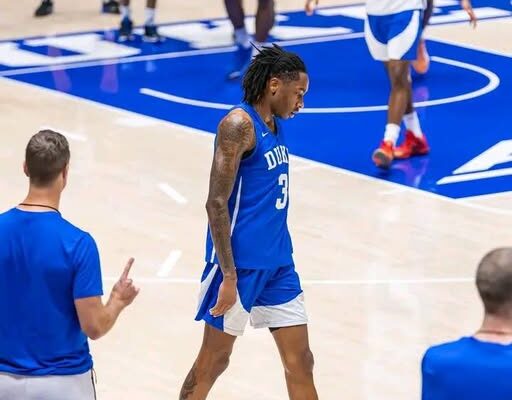“This one change could change Duke’s season before it even starts.” It was not conspicuous. There was no noise. But particularly, what changed during the summer
Everything revolved around one seismic but subtle shift in Duke’s summer training approach—a transformation from traditional ramp-up workouts into high‑intensity, pressure‑filled practices that resemble tournament chaos. That shift was neither flashy nor publicized—but insiders say it’s already reshaping who thrives and who flounders within the program.
SuccessSport360’s July 19, 2025 article made it crystal clear: Duke’s summer practices moved into overdrive. They’re nonstop—fast‑break drills don’t let up, reps don’t slow down, and film sessions feed directly into live chaos drills. As one insider put it: **“There’s no pacing themselves. It’s all gas, no brakes.”**That mentality is now distinguishing between players who genuinely earned their spot and those who leaned on last season’s reputation.
It wasn’t only about talent—it was about adaptability under pressure. Freshman stars like Cameron Boozer, Nik Khamenia, Dame Sarr—and even four‑star signees like Sebastian Wilkins—are competing at such a high level they’re elevating the entire energy in the gym. Those who coasted on hype are getting exposed.
SuccessSport360’s June 28, 2025 story used the term “Hype Filter“—underscoring how this summer has served as a brutal audition. One practice observer said: “He doesn’t care about what you did last season—he cares about right now.” The message: grace period over.
Several returners and newcomers rose to the rigors of this new environment:
- Caleb Foster: From part‑time rotational role to commanding the floor in up‑tempo drills.
- Isaiah Evans: Former five‑star who now plays with attitude and sharper decision‑making.
- Maliq Brown: The transfer anchor who’s become vocal and authoritative on defense, pushing teammates to rotate faster
- Patrick Ngongba II and Darren Harris: Both players, previously bench or cameo contributors, are showing poise in late‑game scenario training.
At the same time, incoming freshman talent is refusing to be relegated: Boozer, Sarr, Khamenia—expecting to start and prove it in every drill.
In this environment, roles aren’t given—they’re earned day in and day out.
After back‑to‑back postseason disappointments, Scheyer shifted from what critics occasionally called a “country club” vibe to full-on accountability. No more waiting turns, no complacency, no earmarked rotations. Instead: every session is a proving ground, every mistake magnified, and every possession matters.
SuccessSport360 put it bluntly: “No more excuses. You’ve either put in the work this offseason or you didn’t.” That tone sets the culture for the entire program.
- Built for March from Day One
Rather than easing in, Duke is simulating tournament chaos right out of the gate—speed, mental strain, decision pressure. Practices replicate what late‑game NCAA scenarios feel like. That’s habit‑forming for March execution.Talent Meets Toughness
This strategy forces players to prove they can perform under pressure—not just shoot well or look athletic. That selection pressure elevates players like Boozer, Brown, Foster, Evans—who compete physically and mentally every possession. - Defensive Cohesion Built Through Intensity
Duke finished the previous season ranked among the nation’s top defenses, limiting opponents to approximately 61.1 PPG and ranking near the top in several efficiency metrics. That defense came from communication, pressure, rotations—habits that demand practice intensity. - Team Depth Strengthens Under Pressure
Reddit conversations reinforce that Duke’s depth isn’t just talent—it’s preparedness. Fans noticed contributions from Ngongba, Harris, Knueppel and others who wouldn’t have cracked meaningful minutes without earning their spots. One fan said this could be “the deepest Duke team I can remember.”
Several observations from Reddit underscore how deep and mental this team’s cohesion feels:
- Freshmen push returners: Boozer’s every‑day aggression in drills left veterans scrambling.
- Live chaos drills follow film sessions: No downtime. Mistakes are punished instantly.
- Pressure filter: Players aren’t allowed to hide behind reputation; only decision-speed and effort earn respect.
As one source said: “Guys who looked great in highlight edits are getting cooked in live drills.
- Early clarity on rotation and roles: Come November, players already know where they stand. Scheyer trusts those who’ve performed in practice heat.
- Sharper game readiness: Duke players enter the season conditioned as decision-makers under duress, not role players easing into their minutes.
- Defensive edge: Elite practice intensity translates to disciplined switching, contesting, and communication on the court.
- Mental toughness: This culture breeds game-time resilience. When outcomes get tight, those who trained relentlessly all summer know how to handle the pressure.
In short: the opportunity gap between expectation and execution narrows—because your best is the only thing you can show in practice.
When you read that teaser line—**“This one change could change Duke’s season before it even starts”—**understand that the change is subtle, invisible off-camera. No late marquee transfers. No roster overhauls. No high-profile NIL drama. Instead, it’s an internal culture recalibration:
- Pristine intensity from Day 1.
- A daily filter sorting those in shape physically, sharp mentally, and hungry consistently.
- A practice model built to resemble March pressure, not August comfort.
That is the transformation happening in Durham under Jon Scheyer—and it’s already reshaping expectations. This summer wasn’t about workouts. It was about selection by pressure, about forging a team that can execute when the lights are brightest. That one change—layering intensity into every drill, every possession, every decision—may be the most critical shift in Duke basketball culture since the coach’s transition period.


